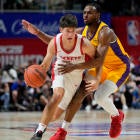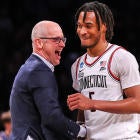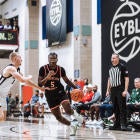
Near the end of "The Scheme," an HBO-produced documentary that will air March 31, convicted felon Christian Dawkins looks into the camera and says, "I want to be very clear with this: Any coach who offers to play a player, in my opinion, is a good guy."
The moment comes in the denouement of the doc and, pointedly, after the juiciest portion of the film reveals what the college basketball public has been waiting to hear for years: tapes of coaches talking to Dawkins about payment schemes for other players.
LSU coach Will Wade and Arizona coach Sean Miller are both heard in the movie; it's the first time these wiretaps, which remain under federal seal, have been disclosed for public consumption. While Dawkins' attorney Steve Haney (who, like Dawkins, frequently appears in the doc) attempted to subpoena Wade and Miller to get them to testify under oath during last April's federal trial, U.S. District Judge Edgardo Ramos found their involvement irrelevant to the heart of the case.
The contents of the Wade/Dawkins call have been previously reported by Yahoo Sports, but to hear Wade speak with Dawkins about what can only be interpreted as a prevalent pay-for-play scheme at LSU is something that could eventually exacerbate the coach's situation with his school and the NCAA. Hearing Wade's voice brings more context than what a transcript can provide. Nevertheless, the transcript from the movie is below.
CBS Sports was provided a screener of the documentary in advance of its airing.
In an undated call between Dawkins and Wade from the summer of 2017 (when we know the FBI tapped Dawkins' phone), the following conversation is had:
WADE: Hopefully (Jaron) Blossomgame's not blowing you up too much right now.
DAWKINS: Well listen, I mean [expletive], he could be playing for LSU or some [expletive]. He could have fifth-year eligibility and if he doesn't get drafted like Randolph Morris or some [expletive] like that.
WADE: We'll take that. We'll take it.
DAWKINS: I know you will. I know you will.
WADE: We could compensate him better than the rookie minimum.
DAWKINS (laughing): You probably right about that, too.
WADE: We'd give him more than the the D-League.
DAWKINS: Exactly. Exactly. God bless us all. God bless us all. So, what's the good word, though?
WADE: All right I was thinking last night on this Smart thing. Like, I'll be honest with you, I'm [expletive] tired of dealing with the thing. Like I'm just [expletive] sick of dealing with this [expletive]. What do you think, 'cause I went to him with a [expletive] strong-ass offer about a month ago. [Expletive] strong. Now, the problem was, I know why he didn't take it now -- it was [expletive] tilted toward the family a little bit. But I mean it was a [expletive] hell of a [expletive] offer. Like, hell of an offer. Especially for a kid who's going to be a two- or three-year kid.
DAWKINS: Right.
WADE: I've made deals for as good a players as him that were [expletive] a lot simpler than this.
The doc cuts from that call to Dawkins making further clear his impression of the conversation with Wade. Dawkins goes so far as to praise Wade for pulling off what he did and keeping his post at LSU.
"100% talking about money," he says in the film. "Just audacity, you gotta take your hat off to him, man. He, not only didn't get charged for anything, not only did the government have all this information and evidence and nothing was happening on a criminal level, he also basically just said [expletive] you to the NCAA and to the university he worked for. Man, that was some G [expletive]. And he said [expletive] you to the people that wasn't with him and he still got to keep his job and make millions of dollars. It's like the perfect storm. This is the life. [Expletive], they're paying him a lot money to win games, bro. … Will Wade is definitely a [expletive] gangster for what he did."
As for Miller, his situation may not be strengthened or worsened as a result of this film. Crucially, what the doc does not have: a wiretap call of Miller and Dawkins discussing payment for former Arizona player Deandre Ayton. That detail was reported in March 2018 by ESPN and remains a white-whale piece of would-be evidence that Miller has vehemently denied ever taking place.
The phone calls in the film reveal Miller to be a coach who is no dummy to the nature of the pay-for-play game -- who is engaging in a back-and-forth with Dawkins -- but at no point does he say anything that would constitute an NCAA violation and at no point does he even explicitly indicate Arizona has or is willing to pay to get players.
In an undated phone call, Miller and Dawkins are having a conversation about the recruitment of Nassir Little. Miller is asking Dawkins about which AAU coach is the point person for Little's recruitment.
MILLER: So, Christian, explain to me the difference, in real talk between Brad and Darrell. Who do I focus on?
DAWKINS: They definitely want to get some [expletive] for themselves because they have been taking care of this kid.
MILLER: Miami doesn't have an advantage over us in that area, do they?
DAWKINS: Well, I'll say this, what Miami does have is Adidas.
MILLER: Right.
Dawkins takes this conversation to mean Miller was inquiring over whether Arizona would have to pay more than Miami (a school that was entirely cleared later on) to land Little.
"Yeah it was no question the conversation all about money I think," Dawkins says. "I mean, from my interpretation, Sean maybe speaks a different language than me, but I'm pretty sure we could all agree that's ... we was talking about what needed to happen to get it done."
In another conversation -- it's not clear if it is the same or a different call -- Dawkins asks Miller if Arizona thinks it can land five-star recruit Naz Reid.
MILLER: No. He's going to LSU. We're not even bringing him on a visit. He's not even visiting. That's all bull----. Like, I'm looking at our recruiting board, he's not even on it. I've never talked to the kid. All this [expletive] hype [expletive] on the phone, it's stupid. He just probably said, you know what, [expletive] you I don't want 75, I want a 120. I may go to Arizona. That's all that was.
DAWKINS: And Will Wade is -- I told Book, I said, 'Will Wade is like driving up the price of [expletive]. 'Cause he's not even, he's not even doing like real numbers.
MILLER: I tell you what, I'll give him credit, he got a big set of balls on him.
DAWKINS: No, Will Wade doesn't give a [expletive], Sean.
These are things NCAA investigators will find highly relevant, of course. But whereas Wade's comments are much more direct ("we could compensate him better than the rookie minimum"), there is no smoking gun here with Miller. Dawkins, who was paid by HBO for his involvement in the film and is now in the music business, makes no hesitation to discredit Miller.
After ESPN's initial story alleging Miller was caught on a wiretap talking to Dawkins about paying for Ayton, Miller came out days later with an emphatic statement at a press conference. Dawkins claims that statement from Miller was nothing more than a high-level acting performance.
"You wanna know my opinion, when Sean Miller had his press conference and said has a player from Arizona ever received money, or did he know anything about a player from Arizona receiving one money, did he lie?" Dawkins says in the film. "Yeah that wasn't true."
The documentary includes a phone call (that was also played during one of the trials) between Dawkins and former Arizona assistant Book Richardson, wherein both of them discuss alleged Miller payments to Ayton. Those assertions have never been proven; that may be critical to the NCAA's case against Miller and Arizona.
When reached by phone, Miller told CBS Sports he had no comment. Attempts to contact Wade were unsuccessful.
Was Dawkins a con man? Was he trying to pay players and their families flagrantly in violation of NCAA rules? Was he more than just an asset to college coaches, or was he less of a power figure in college basketball than what this entire saga has propped him up as? The documentary fails to get its arms around all these questions.
But Dawkins makes for a clear-eyed -- if not obviously problematic -- narrator. His voice and face are the dominating elements to the film, which does a strong job over the course of two hours of establishing who Dawkins is, some of his motives, a few of his flaws and all of the major facets that surrounded the federal government's unprecedented (and perhaps ultimately wasteful) foray into busting up college basketball recruiting.
The most dramatic retelling comes three-fourths of the way into the movie, when Dawkins describes the moments that led up to his arrest on Sept. 25, 2017. He flew up to New York from Atlanta that morning, believing he was having a business meeting for his company. Inside a hotel room at the the W in Times Square, an undercover officer -- who Dawkins for months thought was an investor into his company -- reveals herself.
Within minutes he's sweating and shirtless. Other agents are in the room. They're asking Dawkins to give up Louisville coach Rick Pitino and NBA agent Andy Miller.
At that very moment, Dawkins says he remembers Sean Miller calling his phone. His phone rings and an FBI phone mirrors the call. He does not pick up the call.
"My phone is their phone, basically," Dawkins says.
He can wear a wire or get a lawyer. Dawkins chooses the lawyer.
Doors open, guns up.
"At this point I'm like, well they're just gonna [expletive] kill me," he says. "It's over. I die because of basketball. It was multiple machine guns in my face."
The next morning, nine more men would be arrested in the early hours and charged in the scheme. But it was inside the W hotel that the government's hopes of bringing down kingpins of college basketball died. Dawkins was never going to rat out the coaches to the feds or directly to the NCAA.
The documentary is something a different story. It's Dawkins' story on Dawkins' terms. He's now a twice-convicted felon awaiting prison time. The collateral damage to college basketball is still ongoing, with a stockpile of NCAA cases that could be impacted by what this film provides to people that have never heard these wiretaps, seen the surreptitious videos or understood why Dawkins was doing what he was doing.

















